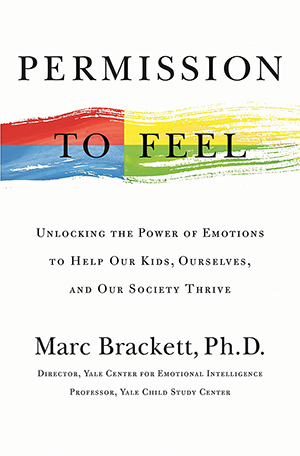Book Review: Permission To Feel: Unlocking The Power Of Emotions To Help Our Kids, Ourselves, And Our Society Thrive

Permission To Feel: Unlocking The Power Of Emotions To Help Our Kids, Ourselves, And Our Society Thrive by Marc Brackett. Celadon Books: New York, NY. 2019. Total pages: 292.
Society has recognized the value of the Intelligent Quotient (IQ) in academics, job placements and assessments of intellectual disabilities. On the other hand, Emotional Intelligence (also known as Emotional Quotient—EQ) is an emerging science contending for a place of its own among scholars and even demonstrating, arguably, a more relevant role in predicting professional success (215). The same can be said at home and school, “30 percent of elementary and middle school students now experience adjustment problems severe enough to require regular counseling. In economically disadvantaged schools, this runs as high as 60 percent” (14). Higher levels of EQ are correlated with lower levels of stress, higher levels of job satisfaction, and a more fulfilled life overall.
Marc Brackett experienced the consequences of a childhood filled with repressed emotions and abuse. He was fortunate, however, to have an uncle who, by accident, discovered the benefits of EQ in the classroom—the missing link in education (10). This relationship shaped his life to the point of turning him into an Emotion Scientist—his lifelong mission. Brackett, a Yale professor and director of the Center for Emotional Intelligence, has the goal of making every school district in America a place where students and teachers become emotion scientists. He hopes to eradicate the stigma associated with expressing feelings and the trauma that comes from repressing feelings. Many children would be saved from bullying, abuse, depression and anxiety.
Brackett has simplified the complex topic of emotions with this acronym: RULER.
- Recognize
- Understand
- Label
- Express
- Regulate
By Recognize, Brackett simply means to be aware when a feeling dominates a situation. Can you recognize when a certain feeling is about to take over? Many find it helpful to take the step of acknowledging that feelings are not, in themselves, evil. In fact, they help to navigate life. Even negative feelings can help in this way. The problem occurs when negative feelings overpower an individual’s ability to relate to others or simply live a fulfilled life.
Understanding the feeling provides the key to an honest assessment of causation—the reason why a certain feeling surfaces. It could be a situation, a thought, or an individual that triggers anger, sadness, or joy. If the feeling leads to a dark place (depression, isolation, anxiety, etc.), then it needs to be changed.
Labeling enhances the vocabulary of feelings. Research shows children and adults have limited vocabulary when it comes to feelings. For instance, there is a difference between being upset in contrast to being enraged. The former is a mild response to a situation that needs to be addressed, while the latter is, most likely, an escalation of an unresolved situation. Using the right word enhances one’s understanding of the feeling—the start of finding a solution. Clarity through a large feeling vocabulary can reduce the unpleasantness of the moment, and allow for sharing with others.
Expressing marks the next action of emotion scientists. As a result, labeling and expressing feelings lowers the amygdala activation (anger or fear triggers) and allows others to meet the need at hand and vice versa. Ultimately, it connects the individual to the rest of the world (107).
Regulating modifies one’s emotions. The emotion scientist is trained to adjust the undesired feeling, avoiding an outburst or any other unhealthy escalation, by applying pre-rehearsed techniques. For instance, self-talk, mindful breathing, and cognitive reframing strategies—reappraisal of a situation—are ways to regulate one’s feelings.i In short, EQ is about awareness of one’s feelings and understanding how it affects one’s self and others.
Additionally, a great tool created by the author is the Mood Meter app. It allows the individual to identify the current general mood in four color-coded quadrants: pleasant–low energy (green); high energy (yellow); unpleasant–low energy (blue); high energy (red). Then, one chooses the most accurate word that precisely describes the feeling. Immediately, a screen prompt enables the user to select the current activity (location), followed by an opportunity to reflect on writing about the present feeling. At this point the user is asked to choose between staying or shifting, giving useful suggestions if one needs to shift emotionally. The app provides weekly and monthly reports in addition to useful articles and videos.
Remembering and explaining RULER is simple; however, applying it takes a lifetime of practice. It is possible, Brackett affirms, to become an emotion scientist. It would change one’s life as well as the lives of those around us.ii
Raising awareness of this topic is a remarkable contribution to life in general. Moreover, the tool created to aid in the vocabulary enhancement of feeling and its regulation—the Mood Meter App—provides a great starting point for professionals, especially for those in social sciences, including pastors. Additionally, the book contains many research sources that link emotions to physical health. Diet, exercise and sleep are pivotal for EQ development. Readers, however, should be aware of the Evolution and LGTBQ+ references used throughout the book.
Although the content is highly relevant for teachers, parents, and individuals seeking self-improvement, pastors and youth workers could interpolate its application into ministry settings. Perhaps, a similar book dedicated to pastoral ministry would be of much help. For instance, the author speaks of Emotional Labor, which is the effort required to manage the way we express our feelings. “A publicly visible facial and bodily display within the workplace.” People in certain professions that involve customer contact (teachers, police officers, flight attendants, etc.) frequently must put on a false front. A similar disconnect also happens at home and with friends, among the people with whom we are most intimate. “Research shows that this so-called surface acting leads to burnout, lower job satisfaction, and even increased anxiety and depression” (129, 130). Pastors were not included on the list; however, should have they been?
 |
Nelson Silva, DMin, serves as the Associate Youth Director for Youth and Young Adult Ministries for the Kentucky-Tennessee Conference. |
iReframing allows one to recognize whatever triggered an emotional experience and then to react, instead, to that new interpretation. This could look for Christians as an opportunity to pray for the individual, choosing to minister to the person instead of taking it personally by imagining a negative option. “He ignored me because he is mad at me for the comment I made.” Instead, “He has too much going on in his life; he is under stress.”
iiBrackett, Marc. Become An Emotion Scientist in 2020. https://www.marcbrackett.com/become-an-emotion-scientist-in-2020/ (accessed April, 2021).
